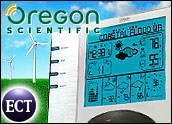
As a legendary poet-songster once insightfully intoned, you don’t need a weatherman to know which way the wind blows, but it helps if you have an Oregon Scientific regional weather station.
The Tualatin, Oregon-based company pulled the wraps off its latest meteorological information center in January at CES, the annual show of shows for GadgetSphere notables, in Las Vegas. If weather is your thing, this puppy will get you pumped.
The US$199.95 unit, dubbed Complete Regional Weather Station with MSN Direct Weather Data Service, is designed with a futuristic look. Its large monochrome display — it measures 6.5 inches diagonally — has a blue backlight, rests between silver wings with aqua controls shaped like thin lozenges, and floats above a circular base.
Even with its backlight on, the display isn’t exceptionally bright, and the characters could be more distinctive, but the unit’s information is written large — large enough to be discerned without reading glasses, a definite plus in my book.
FM Data Connection
Temperature and humidity information for your home is gathered by sensors built into the device. External environmental data is fed into the station through the Microsoft Direct service.
Microsoft Direct is a special wireless service primarily designed to deliver information to a line of smart watches. Information is delivered over the FM band, and coverage is pretty extensive — about 80 percent of the U.S., including my backyard.
Although Microsoft Direct is a subscription service, you don’t need a subscription to use the weather station. It’s probably one of the few times you can use something with the name “Microsoft” connected to it, not pay for it, and not end up in front of a person wearing a black robe.
I compared the information being fed to the unit by Microsoft and my Internet feed to the Weather Channel, and both presented similar readings for my area — so it seems the station was getting good local data and not some kind of generic pablum.
Crawling Alerts
Setting up the unit is remarkably simple. Pop in the four AA batteries included with the device, plug in its AC adapter, place it in a good location for FM reception, and you’re good to go. Information on the unit’s LCD is arranged in modules. The day’s phase of the moon is shown at the top of the display.
Beneath the phases, weather alerts crawl across the screen. The alerts range from sunrise and sunset times to visibility numbers to storm warnings.
When the station receives a serious weather alert, the power light in the base of the unit, which is usually green, will flash red.
Doubles as Alarm Clock
Below the bulletin area, screen left, is the clock-calendar area. The time is received from Microsoft Direct, so you can rest easy about its accuracy and not have to worry about things like Daylight Savings Time.
What’s more, the unit can double as an alarm clock. Beside the clock is a graphic display of the day’s weather.
To the right of the day’s weather are temperature and humidity readings. Beside each reading is an icon showing the current trend in the measure — up, down or steady. You can toggle between outdoor and indoor readings by pressing a control button.
Not an Impulse Buy
Below the clock, screen right, is a chart showing barometric pressure and ultraviolet readings. Not being a meteorologist, I found these charts indecipherable.
Next to the BP data is a three-day forecast. Each day has a graphic — cloudy, rainy, etc. — and such numerical information as expected high and low temperatures and chance of precipitation.
Beside the forecast is a compass dial. It shows wind direction. Wind speed and gusts are shown inside the compass. Below it, there’s a descriptive phrase for the wind conditions — light, moderate storm and so forth.
Considering the price, this weather station won’t be an impulse buy for many consumers, but for weather heads, it will be an appealing diversion.
John Mello is a freelance business and technology writer who can be reached at [email protected].





















































